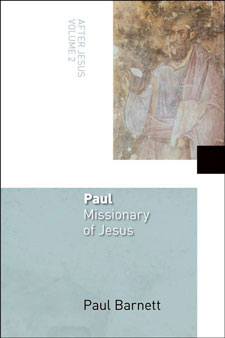Objections to the Christian faith come from many quarters. One of the most damaging is the wall between Jesus and Paul erected by much biblical scholarship. Paul, it is argued, knew little about Jesus, taught a different message to Jesus and had a different agenda. This view has even had an impact beyond the academy. According to the movie The Last Temptation of Christ, Paul could say to Jesus: "I'm glad I met you. Now I'm rid of you. " I've created truth out of longing and faith." Is there really a wall between Jesus and Paul? Has Paul led us astray?
Paul Barnett's second of three volumes exploring the origins of Christianity, which is just as engrossing and encouraging as the first, looks at this issue in depth. Whereas volume one investigated what the first disciples believed and said about Jesus in the first twenty years, volume two looks at the relationship between Jesus and Paul: did Paul's mission and message continue the emphasis and trajectory of the mission and message of Jesus?
 Barnett's answer begins by observing that the information about Jesus in Paul's letters is actually quite impressive, especially given the fact that his letters assume that the churches already knew a great deal. Clearly Paul was aware of the breadth of Jesus' life and work and he appealed to various words and commands of the Lord. Paul knows of Jesus' ancestry, extraordinary birth, upbringing, relatives, and so on, not to mention several details of his death and burial, and of course his resurrection. The main purpose of his letters, to encourage the churches, makes these frequent, incidental gems about Jesus all the more compelling. Further, both geographically and chronologically, Paul's proximity to Jesus suggests that he had ready access to plenty of information.
Barnett's answer begins by observing that the information about Jesus in Paul's letters is actually quite impressive, especially given the fact that his letters assume that the churches already knew a great deal. Clearly Paul was aware of the breadth of Jesus' life and work and he appealed to various words and commands of the Lord. Paul knows of Jesus' ancestry, extraordinary birth, upbringing, relatives, and so on, not to mention several details of his death and burial, and of course his resurrection. The main purpose of his letters, to encourage the churches, makes these frequent, incidental gems about Jesus all the more compelling. Further, both geographically and chronologically, Paul's proximity to Jesus suggests that he had ready access to plenty of information.
The bulk of the book is then taken up with a very thorough sifting of the evidence that links Jesus with Paul's life and work. Both, it emerges, had a two-stage Israel-then-the-nations program. Both share significant elements of a basic posture towards the Law of Moses. Both opposed the Pharisee mindset and championed the grace of God. Along the way Barnett assembles a wealth of fascinating material on Paul, such as reflections on the way he made decisions, his twenty names for Jesus, the authenticity of his letters and the relationship between Acts and Paul's letters. The main thesis of the book is far from merely academic: it is that Paul was a true missionary of Jesus, his "chosen instrument" (Acts 9:15).
Like a good detective novel, Barnett's book examines every clue and follows all the leads in order to arrive at convincing conclusions about the life and thought of the apostle Paul. Without underestimating the contribution of the apostle as the first Christian theologian, Barnett shows how wrong it is to view Paul as "the second founder of Christianity". On the contrary, he makes the case that Paul was utterly "captured by Christ Jesus" (Phil 3:12). Can't wait for volume three!
























